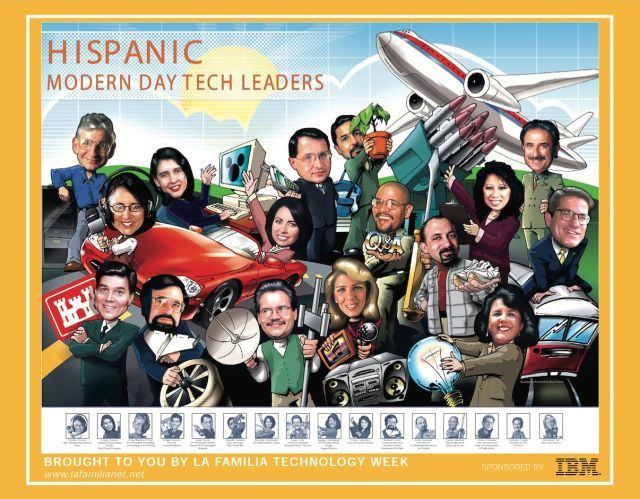
For more than 30 years, Career Communications Group’s Hispanic Engineer & Information Technology magazine has presented personality profiles of Hispanic Americans in science, technology, and business. The fall 2019 edition is available now!
Download the latest issue of Hispanic Engineer & Information Technology here
Hispanics make up 16 percent of the American workforce, but only six percent of scientists and engineers. According to the National Science Foundation, Hispanics constitute larger shares of those employed as social workers or health technologists or technicians than they do of computer and math scientists and physical and related scientists.
Representation of Hispanics in science, technology, engineering, and math (STEM) holds pocketbook implications for workers, says a recent Pew Research report. STEM jobs have relatively high earnings compared with many non-STEM jobs. Among workers with similar education, STEM workers earn significantly more, on average, than non-STEM workers.
In a white paper prepared for the Hispanic Association of Colleges and Universities (HACU), two researchers at the University of Texas at San Antonio said Hispanic-Serving Institutions (HSIs) can increase the number of STEM degrees awarded to Hispanic students, since a fifth of all bachelor’s degrees awarded to Hispanic students in STEM majors are from HSIs.
The researchers also noted that due to the concentration of Hispanic students in community colleges, efforts to increase Latino/STEM participation and completion are dependent on the institutional capacity of both HSIs and community colleges to educate Hispanic students.
A recent report from Excelencia in Education and HACU highlighted the partnership between El Paso Community College and the University of Texas-El Paso (UTEP), which ensures that academic preparation leads to a seamless transfer to its four-year computer science program.
Counselors from UTEP are accessible to all El Paso Community College students to facilitate matriculation, and peer mentors assist in student acclimation. Additionally, opportunities for employment through Student Technology Services serve as a successful tool for retention, enabling students to earn income while learning and practicing computer skills.
Administrators at Georgia Tech’s College of Engineering also point to collaboration with community colleges as part of their success. Through the Regents Engineering Transfer Program, Georgia Tech awards a third of its engineering degrees to graduates who were not original matriculates.
Community colleges in Georgia and Florida have taken part in the program, which includes campus visits, financial aid phone-a-thons, student-faculty mentoring, scholarships and fellowships, and supporting Latino student organizations.
The top institutions awarding Masters Degrees to Latinos in STEM fields are:
1. Universidad Politecnica de Puerto Rico, PR
2. Florida International University, FL
3. The University of Texas at El Paso, TX
4. University of Puerto Rico-Mayaguez, PR
5. University of Southern California, CA
Doctoral Degrees Awarded to Latinos in STEM Fields:
1. Stanford University, CA
2. University of California-Berkeley, CA
3. The University of Texas at El Paso, TX
4. University of California-Davis, CA
5. University of California-Irvine, CA
“The report shines a light on what many of us know to be true: That diversification within STEM post-secondary education, particularly among Hispanics/Latinos over the last decade, has been largely in the area of certificate/associate levels and diminishes at each successive level,”said Dr. Gabriel Montaño, research scientist at the Los Alamos National Laboratory and president of the Society for Chicanos and Native Americans in Science (SACNAS). “The awarding of masters and doctoral degrees through private and research-intensive institutions suggests a potential socioeconomic pattern that would be of significant interest to investigate further,” he said.
SACNAS fosters the success of Chicanos/Hispanics and Native Americans, from college students to professionals, in attaining advanced degrees, careers, and positions of leadership in STEM. The organization has approximately 6,000 members, a larger community of 20,000, with 115 SACNAS student and professional chapters throughout the U.S. and Puerto Rico.
The U.S. Army Corps of Engineers has been tasked with…
Brown and Caldwell, a leading environmental engineering and construction firm,…
Humboldt State University, one of four campuses within the California…